CYCLIC QUADRILATERAL PROBLEMS WITH SOLUTIONS
A cyclic quadrilateral is any four-sided geometric figure whose vertices all lie on a circle.
The opposite angles of a cyclic quadrilateral are supplementary.
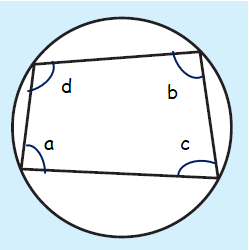
a+b = 180 and c+d = 180
One side subtends equal angles at the other two vertices.
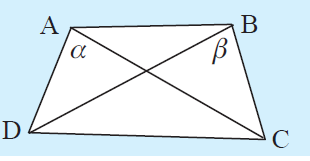
If α = β, then ABCD is a cyclic quadrilateral.
Find the missing angles in the following problems given below.
Example 1 :
Find x given :
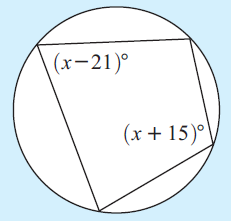
Solution :
In a cyclic quadrilateral, sum of opposite angles are supplementary.
x + 15 + x - 21 = 180
2x - 6 = 180
2x = 186
x = 93
Example 2 :
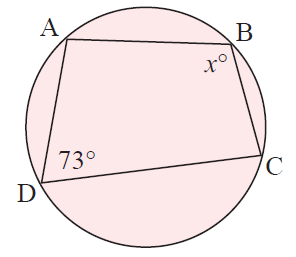
Solution :
73 + x = 180
x = 180-73
x = 107
Example 3 :
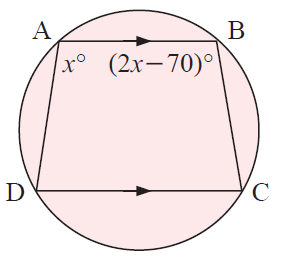
Solution :
x = 2x - 70
70 = 2x-x
x = 70
Example 4 :
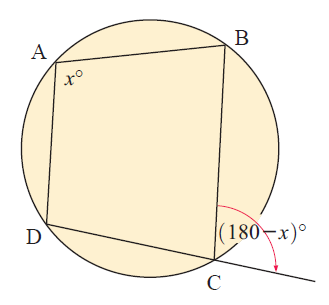
Solution :
Let "y" be <DCB.
<DCB + <BCE = 180
y + 180 - x = 180
y-x = 0 ----(1)
(opposite angles of cyclic quadrilateral)
x+y = 180 ------(2)
(1) = (2)
2y = 180
y = 90
So, x is 90.
Example 5 :
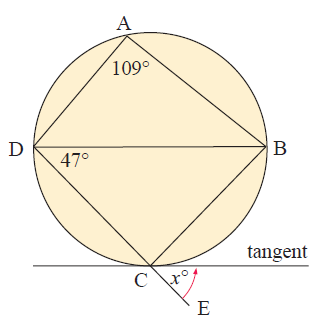
Solution :
<DAB = 109
<DAB + <DCB = 180
109 + <DCB = 180
<DCB = 180 - 109
<DCB = 71
In triangle DBC,
<DBC + <DCB + <BDC = 180
<DBC + 71 + 47 = 180
<DBC = 180-118
<DBC = 62
x = 62
Example 6 :
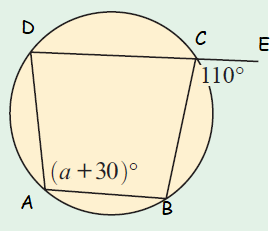
Solution :
Sum of opposite angles are supplementary.
<DAB + <BCD = 180
(a+30) + <BCD = 180 -----(1)
<BCD + <BCE = 180
<BCD + 110 = 180
<BCD = 70
By applying the value of <BCD in (1), we get
(a+30) + 70 = 180
a+100 = 180
a = 80
So, the value of a is 80.
Example 7 :
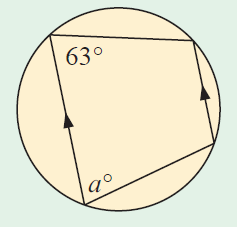
Solution :
Since the two sides are parallel, a and 60 are co-interior angles.
a + 63 = 180
a = 180 - 63
a = 117
So, the missing angle is 117.
Example 8 :
In Figure given below, PQRS is a cyclic quadrilateral whose diagonals intersect at A. If ∠SQR = 80° and ∠QPR = 30°, find ∠SRQ.
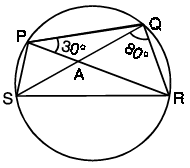
Solution :
∠SQR = 80° and ∠QPR = 30°
∠SPR = 80°
∠SPR + ∠RPQ = 80° + 30°
∠SPQ = 110°
In any cyclic quadrilateral, sum of opposite angles is equal to 180 degree.
∠SRQ = 180° - 110°
∠SRQ = 70°
Example 9 :
PQRS is a cyclic quadrilateral. If ∠Q = ∠R = 65°, find ∠P and ∠S.
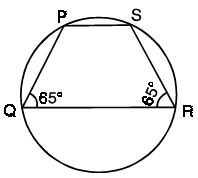
Solution :
Since PS and QR are parallel, the sum of co-interior angles is equal to 180 degree.
∠P + ∠Q = 180
∠P + 65 = 180
∠P = 180 - 65
∠P = 115
Sum of opposite angles is equal to 180 degree.
∠S + ∠Q = 180
∠S + 65 = 180